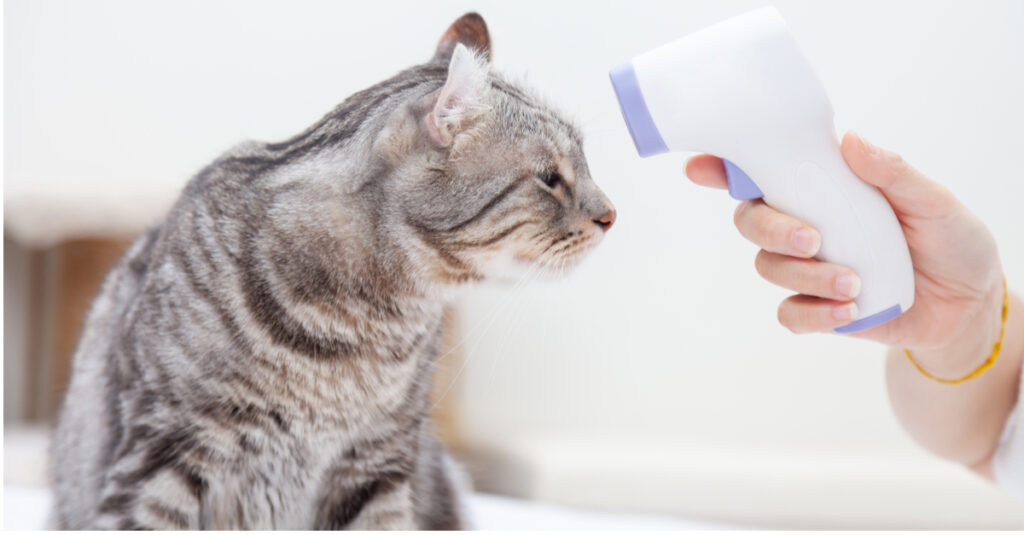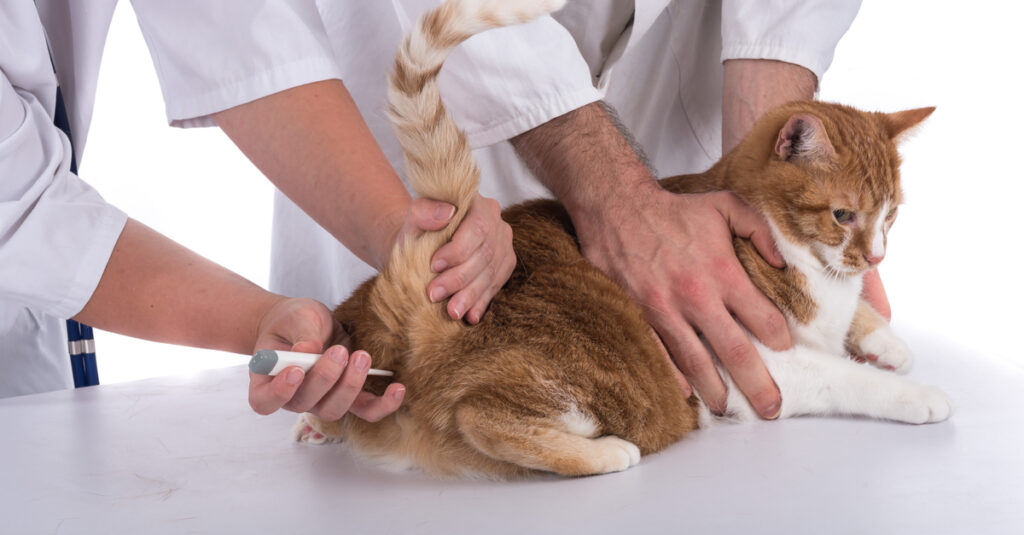Why Is My Cat’s Head Hot? When Should I See The Vet?
Cats have a higher body temperature than humans, so it’s not uncommon for them to feel warm. But if your cat’s head is hot you need to know why and how you can tell if there’s a problem.
Normal body temperature for cat’s ranges from 100.5°F (38°C) to 102°F (39°C). There are some instances when your kitty’s forehead will feel hotter than normal, however especially when she’s sick or stressed out.
Grab the Puuurrr-fect Planner to keep track of your cat’s health and well-being ON SALE NOW!
If your cat is acting normal otherwise and the head is just hot, it could be due to stress or anxiety. However, if the head is hot and your pet seems lethargic, weak or disoriented, your feline may have a fever, infection or other health issue that requires treatment.

The best way to tell if your cat is stressed or anxious is by observing their behavior.
As cats age, they tend to run at a lower temperature than younger cats because their metabolism slows down as they age and they’re less active overall.
Still, an older cat who has a fever may indicate that something else is wrong with her health or immune system.
Read also: Is Human Shampoo Toxic to Cats? Is Baby Shampoo Ok?
Do Cats Foreheads Get Hot When They Have a Fever?
Yes, cats’ foreheads get hot when they have a fever.
You can also touch other parts of her body to feel if they are normal or warm. If it’s hot, then she might have a fever.
Cats’ foreheads can be a bit tricky to read, but there are some key signs that can tell you if your cat is running a fever.
The temperature of a cat’s body is controlled by their hypothalamus gland. When this gland senses that the body is too hot or cold, it sends signals to the sweat glands to secrete more sweat or less sweat, respectively.
Cats have sweat glands on their feet (and other parts of their bodies) but don’t produce much moisture from them, so if your cat has a fever his forehead will probably feel dry.
My Cat Feels Warm
Your cat’s body temperature is generally slightly higher than yours, so her normal temperature ranges from 100.5°F (38°C) to 102°F (39°C).
If she feels unusually warm or hot in comparison to whatever you’re used to, it could be a sign of illness.
The most common causes of fever in cats include:
- Infection from an injury, surgery or dental work
- Inflammation of the kidneys (pyelonephritis), liver (hepatitis) or pancreas (pancreatitis)
- Inflammation of the skin (dermatitis), including flea allergies and ringworm
- Cancer, often of the spleen or lymph nodes
- Parasites that attack the immune system, such as heartworms and intestinal worms
In general, if you can feel heat radiating off a cat, chances are that your kitty isn’t feeling well. However, some cats have a higher body temperature than others so it can be difficult to determine whether or not your feline friend is sick. Or simply enjoying the heat from their surroundings.
Sometimes, the most common cause of cats feeling warm is that they are hot. This can be due to a variety of reasons, including having been in direct sunlight, having been in a small space.
Cats are more sensitive to temperature than other animals, so this should be taken into consideration when determining what’s wrong with your cat.
Cat Feels Warm to Touch
If your cat feels warm to touch, it could be because of a variety of reasons. While this is not a cause for concern, it may be a good idea to understand why your cat feels warm to touch.
One possible reason is that your cat is experiencing a fever. When cats get sick, their bodies will overheat in an attempt to help them get better faster.
This causes them to feel warm when you touch them, but if you notice that your cat has been feeling warmer than usual for several days and the fever has not gone down after 24 hours, then you should take her to the vet immediately.
One of the main reasons why cats feel warm to the touch is because they have an incredibly high metabolic rate.
Meaning that they use energy at an incredibly fast rate! This means that their body temperature will naturally be higher than most other animals in order to keep up with this demand for energy.
In addition to this, their fur acts as an insulator against heat loss by trapping air bubbles between each individual strand of hair and keeping them warm even when they’re not moving around much (like when they’re sleeping).
Why Are My Cats Paws Hot?
If your cat’s paws feel warm, it could be a sign that something is wrong. In most cases, however, the heat in your cat’s paws is nothing to be concerned about. Here are some of the most common reasons why your cat’s paws might feel warm:
She’s been running around outside or playing hard with other pets. Our cats like to play hard and run around outside of the house.
This exercise can raise their body temperature slightly especially if they’ve been out in the sun for long periods of time or if they’re covered in fur.
She has an infection somewhere on her body. Infections often cause redness and inflammation in affected areas of the body, including ears and eyes as well as mouths and noses (in dogs).
But there are also infections that can affect other parts of cats’ bodies, such as their joints or muscles which may cause them to feel warm and even ache at times because of this inflammation.
Read also: Can a Cat Die from Neutering? All You Need to Know
My Cat Has a Fever and Is Lethargic
If your cat has a fever and is lethargic, it could be because of an infection or illness. A high temperature can also cause dehydration which can lead to other complications.
The most common cause of fever in cats is a viral infection, even if your veterinarian suspects that your cat has a viral infection, she may still want to run some tests to rule out other causes of the fever.
Cats can get sick for many reasons, but most often they have a fever as a result of an infection of some kind. Just like in humans, when a cat’s body is infected with any kind of microorganism (virus or bacteria), the body’s immune system kicks into high gear to fight off the invader.
This can cause an increase in body temperature that results in a fever. Fever is one way the body fights off infection, so it’s not always dangerous, but it can be uncomfortable for your cat.
Is It Safe for My Cat to Have a Fever?
In general, yes! Cats are known for being tough and resilient creatures who can handle pretty much anything that comes their way even high fevers! As long as your pet is otherwise acting normally (eating well, drinking water, using the litter box) then there is no reason to worry about your kitty’s health.
What Should I Do If My Cat Has A Fever?
If you notice that your cat is displaying any unusual behavior or symptoms such as lethargy or loss of appetite then you should contact your veterinarian immediately.
How To Tell If Your Cat Has a Fever Without a Thermometer
Not all cats get fevers, but when they do, it can be alarming for both you and your cat. Knowing what to look for can help you determine if your cat has a fever and how serious it is.
Look at your cat’s nose. If it’s dry and cool to the touch, then his temperature is probably normal. But if it’s moist or warm, then he may have a fever.
Another way to check for a fever is by feeling your cat’s gums and tongue. Tongues are normally pink, but when cats have fevers, they turn white or yellowish in color.
Gums should also be pink and healthy-looking; if they’re pale or whitish in color, that could mean there’s an infection brewing somewhere in the body.
If your cat seems lethargic, or just not his or her usual self, it may be time to get him or her checked out by a veterinarian.
Cats can be very stoic and pampered animals, so they may hide their illnesses until they become quite ill.
Are his ears hot? Your cat’s ears should feel cool and dry on the outside. If they feel warm and moist, especially if there’s an odor.
That could be an ear infection. Not all ear infections in cats produce an odor, so don’t rely on this sign alone to diagnose an ear infection.
Does he have a runny nose? A runny nose can be another sign of an upper respiratory infection in cats.
Like kitty colds in people (and dogs!). Cats with runny noses often sneeze as well as having watery eyes and congestion in their chests from coughing.
How To Take a Cat’s Temperature?
If your cat has a fever, taking her temperature can help you determine the severity of her condition and whether it’s time to call the vet.
Your vet may also ask you to take your cat’s temperature if she has been diagnosed with a fever. Although there are other types of thermometers available, most vets recommend that you use a rectal thermometer which is actually more accurate.
Another way way to take a cat’s temperature is with an under-the-tongue thermometer. This type of thermometer is designed to be placed under the tongue and is especially useful for cats because they are less likely to bite or scratch at it than other types of thermometers.

Tips On How to Take Temperature
- Lubricate the tip of the thermometer with petroleum jelly or other lubricant. This helps prevent injury if your kitty gets startled and tries to bite it while you’re taking his temperature.
- Open up one of his ears gently with one hand while holding his head steady with the other hand. Insert the tip of the thermometer into his ear as far as possible without hurting him (about 1 inch).
- Wait until you see a reading on your thermometer before removing it from his ear.
Read also: What Temperature Is Too Hot for Newborn Kittens?
How Long Does a Cat Fever Last?
The length of time it takes for a cat to recover from a fever depends on the cause of their illness as well as how quickly they are treated by their veterinarian.
Most fevers are short-lived and pass within 24 hours without any intervention from pet owners. However, if your pet’s fever doesn’t go away after 24 hours. It may be time to consult a veterinarian for advice on how best to proceed from there on out (Source).
The first step to treating your cat’s fever is to bring her to see your veterinarian as soon as possible. Your veterinarian will perform tests on your kitty to determine what type of infection she has and how severe it is.
Then they will be able to recommend treatment options based on the results of the tests and what type of illness is causing her fever.
Does Cat Fever Go Away on Its Own?
The answer is, some fevers are mild and resolve on their own while other fevers need treatment with antibiotics or other medications to help reduce the body temperature and relieve symptoms such as pain.
It’s also possible for some types of fever to persist for several weeks or months. This can lead to serious complications if left untreated.
For example, a fever that doesn’t go away could cause dehydration, organ failure or even death.
How Do Cats Act When They Are Sick?
Cats will often hide when they are feeling ill, and they might even stop eating or drinking.

If you’re concerned that your cat is sick, you should take them to the vet immediately. They can run tests and diagnose your cat’s condition.
If your cat seems to be acting strangely, you should take them in for a checkup so that your vet can examine them and make sure everything is OK.
if your cat is acting differently than usual, it’s worth taking a look at the following signs of sickness:
- Is your pet eating less? If your cat doesn’t eat for more than 24 hours, this can be a sign that something is wrong.
- Do they seem tired? If your cat is sleeping more than usual or seems to be having trouble staying awake, they might be sick.
- Are they sneezing or coughing? If your cat has been sneezing or coughing recently, it could be a sign that they’re sick.
- Are their eyes watering? If your pet’s eyes are watering or have discharge coming from them, this could indicate an infection in the eye or even conjunctivitis (an inflammation of the membrane covering the eyeballs).
Home Remedy for Cat with Fever
The best treatment for fever in cats is to keep them hydrated and comfortable. You can give your cat a bath or shower to help lower their body temperature.
You can also use a cool compress or ice pack to help bring down the temperature. If your cat has a high fever.
It’s important to monitor them closely, especially if they are not acting normally or have other symptoms such as lethargy, depression, vomiting and diarrhea.
One of the best ways to help your cat feel better is by giving him some home remedies like chicken soup. Chicken soup isn’t just good for humans. It can also help cats with fever feel better. You’ll need:
- 1 cup of chicken broth (make sure it contains no additives)
- 1/4 cup diced cooked chicken breast meat
- 2 tablespoons chopped fresh parsley leaves
- Salt
- 1/2 teaspoon ground ginger powder
- 1 tablespoon plain yogurt (optional), 1/4 teaspoon garlic powder (optional), 1 teaspoon olive oil (optional).
Read also: Why is My Cat Afraid of Ceiling Fan?
Conclusion
There are many factors to consider when trying to determine why your cat’s head is hot, but the most important are how old it is and whether it has eaten recently.
The best way for you to determine if there’s anything seriously wrong with your pet is to take it to the vet, where it can be examined.
For a cat, the brain is very close to the skin; body temperature regulation is therefore effective and very different from our own.
Even a slight rise in its body temperature causes blood flow to the head to increase, making your cat’s head feel hot to human touch.
When your cat sleeps, its body temperature drops, so you may find its head slightly cold.
References
https://vcahospitals.com/know-your-pet/taking-your-pets-temperature
http://www.vetinfo.com/what-does-it-mean-when-cats-ears-are-hot.html
https://partnersah.vet.cornell.edu/pet-owners/temperature
